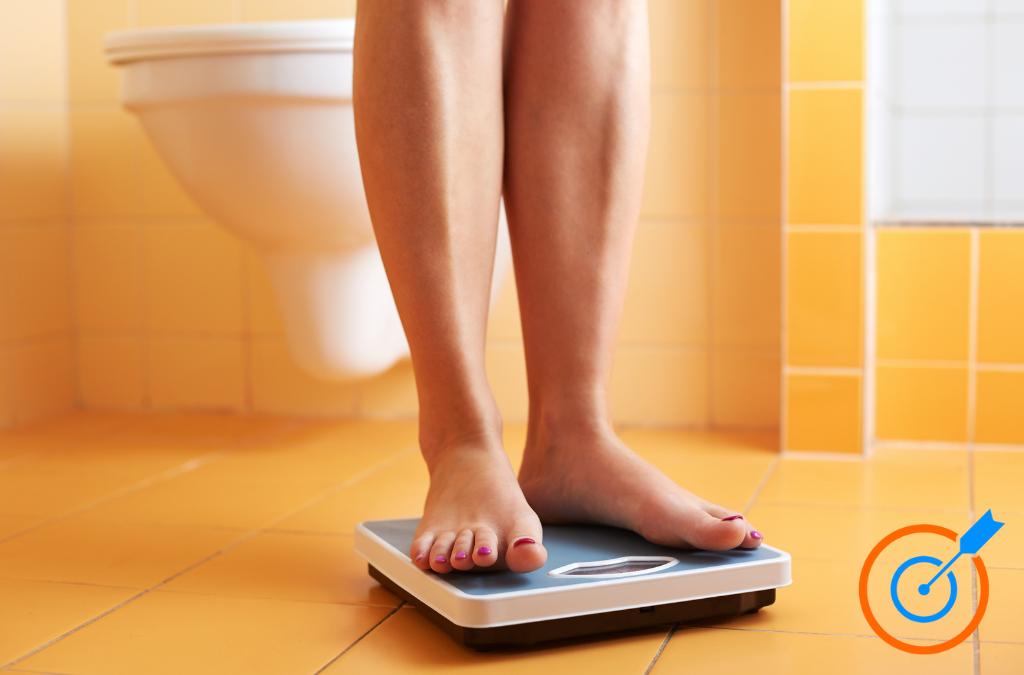Trying to lose weight but the scale won’t budge no matter what you do? For many individuals, the weight scale provides them with a lone solitary number. They benchmark their entire progress on this single metric, which means that momentum, adherence, and further progress all hinge on it.
However, what you see is not always what you get with the scale. A delay in movement on the scale could mean that you’re actually still right on track with your weight loss goals.
What are some common causes of weight gain?
Let’s do a quick reality check and reminder checklist for when your weight scale doesn’t budge or even increases! We'll look at different reasons for water retention, muscle gain, and the overlooked food and water weight.

Water Retention
This is definitely one of the main culprits. Often, individuals will weigh themselves on Monday morning after a busy and indulgent weekend, only to find that they have added 1-2 lbs. of unintentional weight gain. However, if you did not adequately hydrate, or consumed a little more sodium than usual, these lifestyle factors can both lead to the retention of water and increase your weight. Changes in hormone levels due to sleep deprivation can also contribute to an increase in appetite, making it harder to resist late-night snacking and resulting in consuming more calorie-dense foods. It is important to note that this weight gain from water retention and increased appetite is not permanent.
What generally happens to most people is a lot of weight fluctuations because the human body is 75% water. Apart from sodium, there are many additional factors that can influence how our bodies retain water.
Sodium:
Sodium, also known as salt, is necessary for normal body function and the regulation of water. The sodium you consume must come from natural sources like sea salt or pink Himalayan salt. However, consuming excess processed sodium like that from table salt, and canned foods can cause you to gain weight temporarily and increase your risk of heart disease. Numerous studies have shown that highly processed foods can lead to water retention, weight gain, and an increased risk of heart disease.

Exercise:
Exercising can cause water loss through perspiration, which leads to immediate weight loss, especially if you are not hydrating sufficiently. On the other hand, if you consume more water than you lose, you may see a slight increase in weight.
Glycogen levels:
Glycogen is the body’s stored form of carbohydrates, (carbs) which the body stores as glycogen. In order to store glycogen, the body also retains water. This means that the more glycogen you have, the more water you retain, which can lead to an increase in weight. On the contrary, if you lose a significant amount of your glycogen stores, which is often the result of a low-carbohydrate diet, you will lose a lot of water, and therefore, see a lower number on the scale. For example, a 100-g serving of brown rice provides 76.2 grams of carbohydrates, which can contribute to glycogen storage and water retention.
Menstrual cycle:
It’s normal for women to see a slight weight increase due to increased water retention right before they start their period. This is because of fluctuations in certain hormones. Before menstruation, it's common for women to experience a slight weight increase and water retention, often referred to as "period bloating." This phenomenon is due to hormonal fluctuations in estrogen and progesterone. As estrogen levels decrease and progesterone levels rise in the days leading up to menstruation, the body tends to retain more sodium, leading to increased water retention. This can result in symptoms like abdominal bloating, breast tenderness, acne, and mild weight gain, typically a few pounds.
While these changes are a normal part of the menstrual cycle, they can be uncomfortable. Some women find relief through dietary adjustments, staying hydrated, avoiding caffeine and alcohol, and regular exercise. Tracking the menstrual cycle can also help women anticipate and manage these symptoms, allowing them to feel more in control during this time. Understanding the underlying hormonal causes can help women navigate these temporary changes in their bodies with greater ease. Women with this condition are resistant to insulin (the hormone that controls blood sugar), so it may cause weight gain.

Medications:
Some medications cause your body to retain more water. Certain medications can lead to increased water retention in the body as a side effect. This phenomenon occurs due to various mechanisms, depending on the specific medication involved. Some drugs, such as corticosteroids, can cause water retention by altering the balance of electrolytes like sodium and potassium in the body, leading to excess fluid accumulation. In contrast, certain blood pressure medications, like calcium channel blockers, may dilate blood vessels, causing the body to hold onto more sodium and water.
Water retention caused by medications can manifest as swelling in the hands, feet, or ankles, and it may result in weight gain. While these side effects can be uncomfortable, they are often a necessary trade-off for the therapeutic benefits of the medication. It's essential for individuals taking such medications to be aware of these potential effects and consult their healthcare provider for guidance on managing water retention while continuing their prescribed treatment.
Dehydration:
This might seem counter-intuitive, but being dehydrated causes the body to retain more water. Counterintuitively, when the body is dehydrated, it can trigger a response where it retains more water as a protective mechanism. When the body senses a shortage of fluids, it goes into a state of water conservation, and as a result, it retains more water in cells and tissues. This retention can lead to symptoms such as bloating, swelling, and an overall feeling of puffiness. Therefore, staying properly hydrated is crucial for maintaining a healthy fluid balance and preventing the body from holding onto excess water. Drinking an adequate amount of water helps signal to the body that it is well-hydrated and can release stored fluids, promoting a more balanced and comfortable state of hydration.

Muscle Gain
If you are following a nutrition plan, you have no doubt ramped up your resistance training at the same time right? Even if you haven’t started working out more aggressively the simple fact that you’re eating better can create a better environment for building muscle mass.
If you’ve been a health seeker for any length of time I’m sure you’ve heard this before, muscle weighs more than fat. Well, muscle is more dense than fat tissue and whilst it is more difficult to gain than fat, the change or lack thereof in weight could be due to an increase in lean muscle mass over a long time.
Think about it! You may have even lost fat but gained muscle because of your strength training, but the scale is giving you a very distorted image of your progress!

Food and Water Weight
Are you consistently weighing yourself in the mornings, after emptying your bladder and perhaps even coughing, and wondering why your weight might have varied compared to last week? It's important to recognize that food and liquids have more weight than many people realize, which can lead to weight fluctuations. For a more accurate reading, it's advisable to weigh yourself first thing in the morning before eating or drinking anything. It's worth noting that the average adult's weight can fluctuate by as much as 5 or 6 pounds per day due to factors like fluid retention and changes in fat cell activity.
Additionally, keep in mind that normal bodily excretions, such as urine and feces, can collectively weigh a couple of pounds and contribute to weight fluctuations. So, don't be surprised if your weight varies slightly due to these factors.
Conclusion
There can be many reasons that can cause your weight to fluctuate or give you the appearance that you've gone off track. The best thing to do is not weigh yourself so frequently, once a week is sufficient or better yet a couple of times a month. You can also use a tape measure instead rather than the scale to track inches that are lost which can give you a more accurate assessment of how you're doing. A smart scale that also does body fat measurements, muscle and water weight can also give you a better understanding of your body composition. Whatever you do don't give up and don't totally rely on the scale. You've got this!

FAQs Related To Unexpected Weight Gain
If you are experiencing unexplained weight gain, it is important to consult with a healthcare professional to determine if there may be an underlying medical condition contributing to your weight gain. A healthcare provider can perform a thorough evaluation, which may include a physical examination, a review of your medical history, and possibly ordering laboratory tests or imaging studies. These assessments can help identify potential medical conditions that could be causing weight gain, such as hormonal imbalances, thyroid disorders, certain medications, or underlying metabolic conditions. It is always best to seek professional medical advice for a proper diagnosis and appropriate treatment if needed.
There are several common causes of weight gain, including:
1. Poor diet: Consuming a diet high in processed foods, sugary beverages, and unhealthy fats can contribute to extra calories and weight gain.
2. Lack of physical activity: Leading a sedentary lifestyle with little to no exercise can lead to weight gain over time.
3. Genetics: Some people may be genetically predisposed to gaining weight more easily than others.
4. Medical conditions: Certain medical conditions, such as hypothyroidism or polycystic ovary syndrome (PCOS), can cause weight gain or make it more difficult to lose weight.
5. Medications: Some medications, such as antidepressants or corticosteroids, can cause weight gain as a side effect.
6. Emotional factors: Stress, anxiety, and emotional eating can contribute to weight gain and obesity.
It's important to remember that everyone's body is different and there may be other individual factors contributing to weight gain. If you are concerned about your weight or experiencing unexplained weight gain, it's always a good idea to consult with a healthcare professional for personalized advice and guidance.
To achieve healthy weight gain, it is important to focus on consuming nutrient-dense foods that provide a balance of macronutrients and essential vitamins and minerals. Some foods that can be included in a diet for healthy weight gain include:
1. Lean proteins: Increase your protein intake with lean proteins like chicken breast, turkey, fish, tofu, eggs, and Greek yogurt. These provide essential amino acids for muscle growth and repair.
2. Whole grains: Opt for whole grain options like brown rice, quinoa, oats, and whole wheat bread. They are high in fiber and provide sustained energy.
3. Healthy fats: Include sources of healthy fats like avocados, nuts (almonds, walnuts), seeds (chia seeds, flaxseeds), and olive oil. These provide extra calories while promoting heart health.
4. Dairy or dairy alternatives: Milk, cheese, and yogurt are good sources of protein and calcium. If you prefer alternatives, go for fortified plant-based options like almond milk or soy milk.
5. Nutrient-dense whole foods: Include fruits like bananas, berries, apples, and vegetables such as sweet potatoes, broccoli, and spinach. They provide vitamins and minerals along with carbohydrates.
6. Snacks: Incorporate calorie-dense snacks like trail mix with nuts and dried fruits or nut butter spread on whole grain crackers.
Remember to consult with a nutritionist, registered dietitian or healthcare professional to create an individualized plan based on your specific needs and goals for healthy weight gain.




0 comments